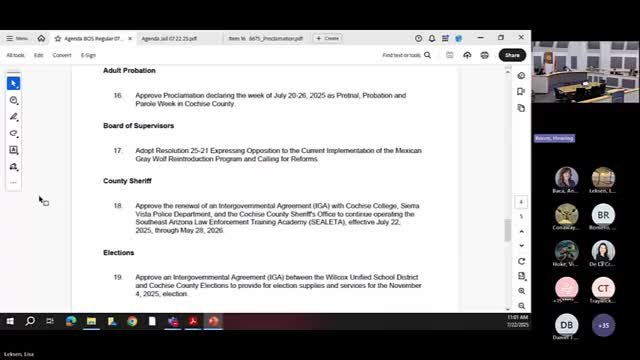This article summarizes the key points discussed during a meeting.
The resolution was presented by board members and led to discussions with several public speakers. Among them was Anne Presina, a ranch owner, who suggested that the cattle industry has harmed native grasslands and wildlife. She advocated for the recovery of Mexico’s gray wolves and urged the use of public funds to support their population, emphasizing the importance of ecological balance and coexistence between ranching and wildlife.
Retired USDA wildlife expert James Schmidt countered Presina’s arguments, showing strong backing for the resolution. He claimed that the presence of wolves could threaten the livelihoods of livestock and ranchers in Cochise County, noting that the area isn’t suitable for wolf populations like those in national parks. His comments resonated with others who voiced concerns about the impact of wolves on agriculture.
However, not all opinions at the meeting aligned with the resolution. Zach Alma pointed out the need for broader representation, stressing that ranch communities only make up a small fraction of the county’s population. He called for a more inclusive dialogue to consider diverse resident opinions on ecological issues and wildlife management.
Another speaker, Allison Morse, proposed a revised version of the resolution focused on incorporating expert opinions and fostering coexistence, rather than advocating for wolf removal. She noted that ranchers constitute a minority in the county and encouraged the board to take into account the majority’s support for Mexican gray wolves.
Wildlife management expert Dr. Letris Neals shared her global experiences, advocating for sustainable ranching practices that can coexist with predators. She argued that restoring wolf populations could enhance the ecosystem and improve conditions in Cochise County.
The discussions during the meeting illustrate the community’s efforts to find a balance between farming benefits and wildlife conservation. With the board’s considerations in mind, the focus remains on local ranchers, wildlife advocates, and ecological impacts. The outcomes of this discussion could shape future policies and community relations in Cochise County, emphasizing the need for collaboration and understanding among all stakeholders.







